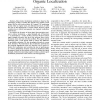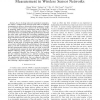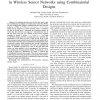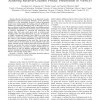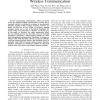147
Voted
INFOCOM
2011
IEEE
14 years 6 months ago
2011
IEEE
Abstract—We consider the problem of jointly optimizing channel pairing, channel-user assignment, and power allocation in a single-relay multiple-access system. The optimization o...
120
click to vote
INFOCOM
2011
IEEE
14 years 6 months ago
2011
IEEE
—In wireless sensor networks, multiple-coverage, in which each point is covered by more than one sensor, is often required to improve detection quality and achieve high fault tol...
131
Voted
INFOCOM
2011
IEEE
14 years 6 months ago
2011
IEEE
—In this work, for a wireless sensor network (WSN) of n randomly placed sensors with node density λ ∈ [1, n], we study the tradeoffs between the aggregation throughput and gat...
119
Voted
INFOCOM
2011
IEEE
14 years 6 months ago
2011
IEEE
—Many indoor localization methods are based on the association of 802.11 wireless RF signals from wireless access points (WAPs) with location labels. An “organic” RF position...
168
Voted
INFOCOM
2011
IEEE
14 years 6 months ago
2011
IEEE
Abstract—Due to its large scale and constrained communication radius, a wireless sensor network mostly relies on multi-hop transmissions to deliver a data packet along a sequence...
162
Voted
INFOCOM
2011
IEEE
14 years 6 months ago
2011
IEEE
—We address pairwise and (for the first time) triple key establishment problems in wireless sensor networks (WSN). We use combinatorial designs to establish pairwise keys betwee...
134
Voted
INFOCOM
2011
IEEE
14 years 6 months ago
2011
IEEE
—Power consumption imposes a significant cost for data centers implementing cloud services, yet much of that power is used to maintain excess service capacity during periods of ...
134
Voted
INFOCOM
2011
IEEE
14 years 6 months ago
2011
IEEE
—Receiver-location privacy is an important security requirement in privacy-preserving Vehicular Ad hoc Networks (VANETs), yet the unavailable receiver’s location information ma...
117
Voted
INFOCOM
2011
IEEE
14 years 6 months ago
2011
IEEE
—Anti-jamming communication without pre-shared secrets has gained increasing research interest recently and is commonly tackled by utilizing the technique of uncoordinated freque...
154
Voted
INFOCOM
2011
IEEE
14 years 6 months ago
2011
IEEE
Abstract—By ‘optimal CSMA’ we denote a promising approach to maximize throughput-based utility in wireless networks without message passing or synchronization among nodes. De...

